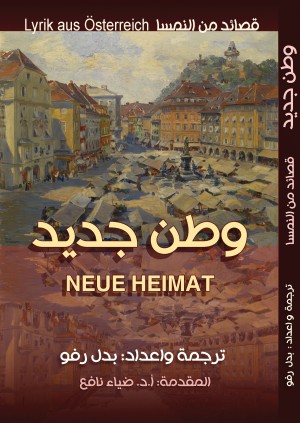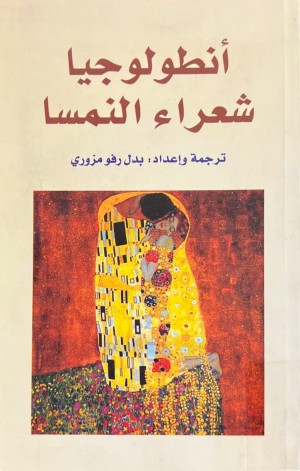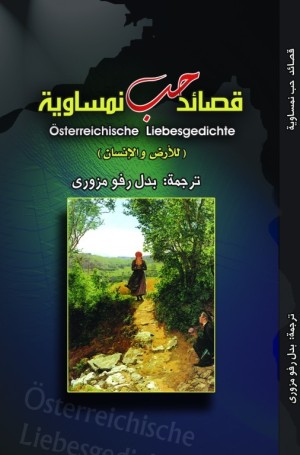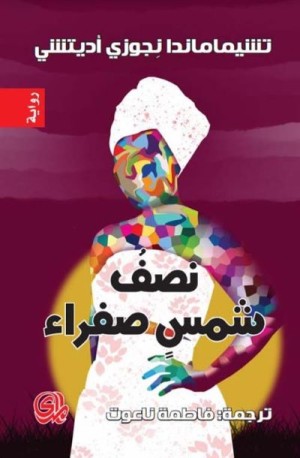بين كتبة وكتاب الحقل الأدبي في مصر المعاصرة
(0)
بقلم: ريشار جاكمون
التصنيف: مترجم
الناشر: دار المستقبل العربي
عام: 2004
بين كتبة وكتاب : الحقل الأدبي في مصر المعاصرة
تأليف ريشار جاكمون وترجمه من الفرنسية الى العربية بشير السباعي
مزيد من القراءة
مقالات ذات صلة
حماة.. و رعاة.. و رقباء
بقلم: المحرر
بقلم: المحرر
The Shifting Limits of the Sayable in Egyptian Fiction
بقلم: ريشار جاكمون
بقلم: ريشار جاكمون
Cairo fieldwork: magical dualisms
بقلم: المحرر
بقلم: المحرر
فعاليات

العربية السعيدة في بيت يكن
إبريل 15, 2025
العربية السعيدة، لتوركل هانسن وترجمة سوسن كردوش قس...

الأديب: رؤية ومسيرة ... حوار مع إيلان بابيه عبر زووم
مارس 15, 2025
تمت هذه الحلقة في 15 مارس 2025 ، تستطيع الان مشاهد...

مسافر يبحث عن ماء
فبراير 17, 2025
تقيم نقابة اتحاد كتاب مصرشعبة أدب الرحلات تحت رعاي...

مناقشة رواية النباتية لهان كانج الحاصلة على جائزة نوبل للأدب
نوفمبر 08, 2024
تمت منااقشة رواية النباتية يوم الجمعة 8 نوفمبر 202...





Admin - منذ 5 سنوات
Richard Jacquemond's Response to Readers' Comments 2006
رد الأستاذ ريشار جاكمون على حوار القراء حول كتابه بين كتبة وكتاب
Dear Arab World Book readers,
Many thanks for all those valuable comments, and more thanks to the Arab World Books forum for offering me this opportunity. It is a great pleasure and privilege, for any writer – whether he be a creative writer or an academic like myself – to have access to his readers’ opinions and reactions. The quality of most of your comments testifies to the success of the AWB forum in bringing together a highly committed community of Arab readers. I answer in English for facility’s sake only – I’m still too slow at the Arabic keyboard. Since I have already responded to the earlier comments (see below), I’ll concentrate here on the later ones.
To Borhan Riad: I agree with you as regards the influence of the Egyptian writers on society. I have given more attention to the influence of their political commitment on their literary output and I have probably underanalysed (and thus underestimated) the social influence of their political/journalistic writings, as well as their intellectual/political contribution to what you call “general ideological trends”.
To Hani and Mohammed Abed: The issue of the relation between the writers and authority (political or religious) is at the core of my research, because it is at the core of the modern Egyptian (and Arab) writers’ predicament. I have tried to show in my book that this relation is a very complex and intricate one, which certainly cannot be summarized in two or three lines.
To Rita: I do not consider Egyptian Coptic writers as a distinct literary group or trend and I agree with you: they are part and parcel of the Egyptian writing scene. What I simply did is identify two broad trends within the writers who belong to the Coptic community: some of them tend to obliterate their Coptic identity in their writings by choosing mainly or exclusively themes and characters which are “neutral” religion wise (Alfred Farag, Mikhail Roman, Maguid Toubia…), while others (like Kharrat or Nabil Naoum) do not refrain from dealing with themes and characters which have a clear Coptic identity. This obviously has to do with the formers’ ambition to be part and parcel of the traditional model of the committed writer (“damir al-umma”) and the latters’ relative distance vis-à-vis this model. Of course, I’m talking here about a general trend, which would certainly be confirmed, nuanced or infirmed by closer analysis of this or that particular writer or piece of work.
To Amr Mahgoub: I do not see in the success of “Yacoubian Building” any qualitative change (naqla naw’eyya), but rather a spectacular confirmation of my conclusion: it shows that what I called the “realistic-reformist paradigm” and the model of the committed writer (see Alaa El-Aswany’s prolific writings in the opposition press) are still alive and well and corresponds to the public’s expectations.
To Suzanne: My work is not that of a literary critic, but rather that of an historian and a sociologist of culture. As such, it refrains deliberately from issuing value judgments on the literary works it deals with. It cannot in any way replace the internal reading of the literary works as works of art, nor deny the critics’ (and the readers’) right to issue their own value judgments. What it does however is give some keys to understand why certain types of writing are considered “pieces of art” by critics and/or readers while others are not, or in other words, how does a particular society (namely, contemporary Egypt) build up a particular conception of literature, a particular aesthetics, and the constant struggles that take place within that society (or rather within its cultural elite) in order to assert and institutionalize – or transform and subvert – this conception or these aesthetics.
Again, I thank you all for your serious and in-depth readings of my work. I’ll keep on following the AWB forum’s discussions and we’ll have certainly many other opportunities to discuss these issues.
Richard Jacquemond.
Admin - منذ 5 سنوات
من ارشيف تعليقات القراء 2006
name: Borhan Riad
This book represents an attempt to dissect the struggle that exists within all writers between artistic integrity and social credibility which in itself represents a clever approach. However unfortunately the author does not take into account the interaction between different literary trends on the one hand and the broader trends in society on the other. In this book, the literary establishement is isolated from its natural setting in society. General ideological trends such as communism, nasserism, Islamism , etc .are correctly referred to as influencing factors in Egyptian society yet not enough emphasis is put on the role that writers have had on the evolution of these trends. In his conclusion the author indicates what he considers to be criteria to prove the success of Egyptian literature (the number of titles – the role of women – translation into foreign languages). A more important criteria however to measure success or failure would have been the influence of literature on the evolution of society as a whole. Nevertheless, my comment should not detract from the very high quality of this work. I would like to take this opportunity to thank the author and arabworldbooks for selecting this book.
name:
I was particularly impressed about the part on Egyptian literary works written in French which I believe represents a welcome contribution.
name: hani
يحتم الانعدام شبه التام لتأثير الأدب في المجتمع أن ينشغل الكتاب بالسياسة بصورة أو بأخرى فسرعان ما تتحول الكتابة الى أداة أو بوق يؤهل صاحبه لآن يتبنى موقفا سياسيا سواء لصالح النظام أو ضده.
name: محمد عابد
تتمثل مأساة الكاتب المصرى فى وقوعه رهينة بين السلطة السياسية من جهة وتعدد السلطات الدينية من جهة أخرى، ومن ثم حتمية انهزامه ولهذا فأختلف مع النتيجة الي توصل اليها المسيو جاكمون بأن الانتليجنسيا المصرية مرتمية في أحضان السلطة السياسية كرد فعل لانتشار التيارات الأصولية.
name: Liana Akkad
Mr. Jacquemond clearly possesses a broad and intimate knowledge of modern Egyptian writers and their works as well as a certain understanding of Egyptian history and society. This allows him to successfully play the role of a sympathetic but objective external observer. This is a book characterized by vision and objectivity while at the same time liberated from emotional positions and the need to defend predetermined positions and engage in personal vendettas.
name: Rita
I disagree completely with mr. Jackemond when he considers Egyptian Coptic wirters as a distinct literary group or trend. Any person who has read the works of Coptic writers will discover that they are part and parcel of the Egyptian writing scene and that in the case of most writers if the author’s religion is unknown to the reader it will be impossible to determine their religion. And even with writers such as Edward Kharrat whose works feature the Coptic community in Egypt , this only happens within the context of the larger egpyptian society and the author himself is a key player in the larger Egyptian literary scene.
name: عمرو محجوب
من المؤسف ان الكتاب على ما يبدو صدر سابقا على رواية عمارة يعقوبيان التي مثلت في تقديرى المتواضع نقلة نوعية في مسيرة الأدب العربي ليس بالضرورة من حيث المضمون والقالب الفني ولكن أساسا لنجاحها في الوصول الى الشارع بشكل غير مسبوق
name: أمووورة
مقدمة المؤلف تتميز بكونها خطابا شخصيا يتوجه به السيد ريشار الى القارئ مباشرة فيشرح أهدافه من هذا العمل والمصاعب التي واجهته وبهذا يخلق علاقة حميمة مع القارئ منذ بداية العمل
name: haikal riadh
scribes and writers in Iraq nowadays are busy to put their almost to publish a suitable issues through the critical situation and non- secure society. It is in my opinion the consequence of a sort a social and religious crisis which load the writers to miserable fact.Most of them forget or like to forget the characteristics in the introduction of topical problems which they are moving up & down in their mind, sometimes leading- in some of the writers- what is meant by citizenship. I myself have been considered as one of the scientific writers i could not have the courage to deal with sensitive issues which may collapse with the policy of the government. Some of the writers become astonished to get suitable selection for the different types of literature so they are facing problems which will interfere with the comprehensive different thoughts.so i feel it is not easy for the writers to finish the issue smoothly.
name: suzanne
The author finds himself in the same pitfall as conventional literary critics today. In this work, writers and their works are simply portrayed as representatives of trends rather than artists and works of art. The brilliance or mediocrity of the literary mind is sorely missed in this book. If everything is a text, bland and indistinguishable then art is indeed dead.
name:
أعجبني في هذا الكتاب أنه يتناول الأدب المصري الحديث في إطار نظرة شاملة للأدب بصفة عامة، فالرواية المصرية هي امتداد طبيعي للرواية في أمريكا الجنوبية وافريقيا وآسيا وتتفاعل بشكل مباشر مع المركز في أمريكا وأوربا، كما يركز المؤلف على الاشكالية الأزلية المتمثلة في عظمة المثقف وبؤسه بصفة عامة والكاتب على وجه الخصوص.
name: جاسم
أثار الكتاب في نفسي ثلاث دهشات أولا لوضعنا الثقافي والأكاديمي والذي يتقبل دون غضاضة أن يأتي باحث فرنسي ليحكي لنا عن أدبنا ، وأندهشت ثانيا لانحياز الناشر المصري لهذا الكتاب على حساب مئات الدراسات والتي لابد أن يكون باحثون مصريون قد قاموا بها, وأندهشت ثالثا لاختيار المنتدى لهذا الكتاب ضمن عشرات الآلاف من العناوين التي تزخر بها المكتبة العربية
name: R.Jacquemond
Dear FI "Bayn kataba wa-kuttab" is not precisely the translation of a PhD thesis, but the translation of "Entre scribes et écrivains", a book which is indeed based on a PhD thesis, but with considerable rewriting and shortening in order to make it readable to a larger audience. However, it remains a piece on literature, not a piece of literature, and thus it is not meant to appeal to the widest of audiences or to compete with "Awlad haretna" and other masterpieces of modern Arabic literature! I agree with you that the Arabic translation might not help - although I think that it is very much a general problem in contemporary Arabic translation, rather than a problem with this particular translation. If you read David Tresilian's English translation of the conclusion of the book ("Retrospects and prospects", see link on this month's book page), you might agree with me that it is quite readable. The question of the relationship between religion (in general, and not only islam) and literary expression is obviously crucial in today Egypt, but it is certainly not the only challenge writers are confronted to. My research deals with many other issues and one of my main points is to assert that, and to explain why, despite of all these constraints and challenges, literary writing is still alive and well in Egypt today - and the Arab World Books Forum is but one of the many expressions of this relentless creativity! Finally, I do agree with you that my analysis "cannot be complete and correct real analysis about Egyptian writers"; however, this does not apply only to my analysis as a "French scholar" but to any analysis, wherever it comes from. Understanding a society, a specific social group and its artistic and/or intellectual production is not an exact science. It is always informed by the position of the actor/observer, whether he be an insider or an outsider.
name: Arab World Books Team
Dear KK and FI
Thank you for the valuable comments on our readers club selections. You might be interested to know that nominations to the readers club are made through an annual survey sent to a large number of our members 50% of whom are just book lovers like you and me, the rest writers and critics. If you are interested to help with this task regularly please let us know because you are more than welcome to do so.
name: FI
This is a translation of the R. Jacquemond thesis for a doctorate degree at a French university about Egyptian literature during the last 50 years. Though it is unusual to translate someone’s Ph.D. thesis and to distribute it between i.e. the subscribers of the Montada, I have read this thesis in its Arabic translation. Naturally the translation from French to Arabic of this thesis is worthwhile but it should be available only to those academicians or those interested to do research in this direction. I am not sure if your readers are considered academicians in literature!! The Arabic translation of this book is not the best one and the translation could be better done to enable following up the subject in a smooth way. Nevertheless the book gives the reader a critical assessment from the author’s point of view about Egyptian literature during the last period. The author concluded, and I agree with him, that the biggest obstacle facing Egyptian writers are 1. The Eslamization of every aspect of life and to some extent politics specifically during the last 25 years. I appreciate the introduction of the book by mentioning the very sad event of stabbing and trying to kill the genius writer Mahfouz. Other examples are Rushdie, van Gogh jr. etc 2. There is no freedom of the synthesis of thought in literature with Islamic control from Al Azher and/or terrorists’ organizations. The earlier era in Egyptian writing from 1900 to 1970 was rich in bright writers, translation of good quality international work. From the time of Sadat and Egyptian literature is getting inferior (of course with exceptions) due to islamists and also that Gulf states are employing writers to prepare appropriate writing according to their own convenience with red lines that must not be crossed. This critical analysis from the French scholar cannot be complete and correct real analysis about Egyptian writers during that period. Whatever the relation of R. Jacquemond to Egyptian literature due to his specialization or due to his family connection, his analysis couldn’t be real. Nevertheless it is mere a Ph.D. thesis expressing his sole opinion. He was very tactical and simulated some Egyptian writers who do not want to be provocative to any local Egyptian political or the strong religious figures. I have further comments on the material in the book (Thesis), related to some authors’ comments about Mahfouz Novel Awlad Haretna. It was written in 1959 and thanks to the time Nasser and his own intervention through the protection of Haikal for its serial publications in AlaHram. This great Novel about the past, present and future imagination of the world human history embraces what was written 50 years later by Rushdie, Brown etc. The book was available to Egyptians at very late time after its publication in Beirut. Then during Islamismus after Sadat leadership, then Mubarak, the genius Mahfouz was stabbed by terrorists when his age was above 80. So what R. Jacquemond expects from Mahfouz to say to reports other than, Yes Alazher should decide about the feasibility of the publication. R. Jacquemond Should put himself in place of Mahfouz and under the old age and terrorism. Mahfouz who fought along all his life against all types of suppression for writers’ freedom would not care about religious dictatorship. Certainly he did not mean what he said. Therefore, R. Jacquemon did not analyze this event scientifically but only superficially. Otherwise the book of R. Jacquemond is suitable for his doctorate degree but not to be publicized between Egyptian intellectuals in the way it is now done. The last two points would be: - A question to the committee who selected this book for Montada members. How many readers will read this book and give it a kind of credit between all your members - I am asking you kindly to give the reader the chance to select your monthly book at least one of two selected books An immigrant who loves real democracy without religion dictatorship in free thinking